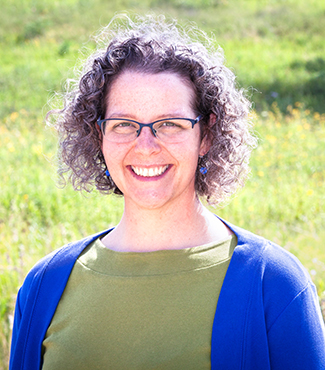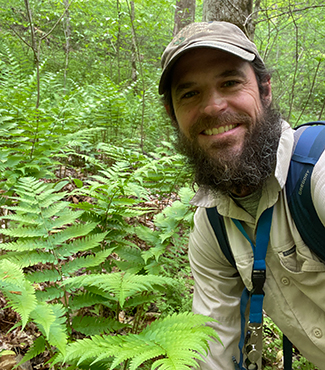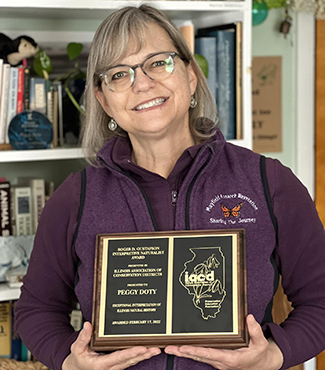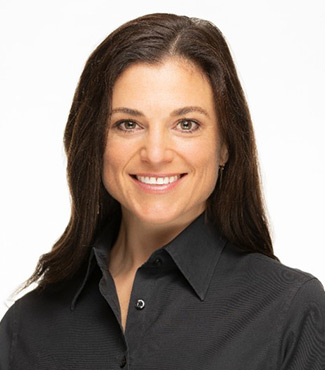
|
May 2024 Educational Program The Impact of Bison on the Prairie Ecology of Nachusa Grasslands Dr. Elizabeth Bach will talk about the long-term plant community monitoring at Nachusa Grasslands as well as research coming out from the first several years with bison. Ecosystem restoration provides potential to reverse losses in biodiversity and ecosystem functioning. Long-term monitoring is essential to understanding if restoration projects deliver on this potential. In this talk, Dr. Bach will present long-term, multi-trophic data collected across the 35-year history of the Nachusa Grasslands preserve near Dixon, Illinois. Dr. Bach is the Research Scientist at The Nature Conservancy’s Nachusa Grasslands where she works with scientists, land managers, and volunteer stewards to investigate questions about tallgrass prairie restoration ecology. Her own research expertise focuses on soil ecology, exploring how below ground biology supports tallgrass prairie ecosystems through plant-soil interactions and nutrient and carbon cycling.
April 2024 Educational Program The Ecology of Spring Ephemeral Wildflowers Over 100 native fern species can be found in Illinois. This Zoom presentation will introduce basic fern terminology with photos and identification tips to identify them in the wild. Christopher David Benda is a botanist living in southern Illinois. He coordinates the Plants of Concern Southern Illinois Program for the Chicago Botanic Garden, conducts rare plant surveys for the Shawnee National Forest, and teaches The Flora of Southern Illinois at Southern Illinois University. An accomplished photographer under the moniker Illinois Botanizer, Chris shares his extensive collection of plant photos on his website, illinoisbotanizer.com. Chris can be reached by email at botanizer@gmail.com.
March 2024 Educational Program Wildlife is Not Random So you’ve made the decision to create a beautiful and environmentally-friendly native plant garden. Now your garden is full of wonderful pollinators such as monarch butterflies, solitary bees, and clearwing moths that dart from flower to flower like hummingbirds. There are myriad species of interesting birds like warblers and woodpeckers and vireos. Success! But you also notice some larger, mammalian creatures like squirrels, raccoons, and skunks that have taken a shine to your plantings. In her presentation, Wildlife is Not Random, Peggy Anesi will discuss that whether you plant cultivars, natives, or garden vegetables, you may be welcoming in more creatures to your yard. A favorite, informative, and entertaining speaker, Peggy will join us via Zoom to help us understand and deal with our wild neighbors. She explains, “ If we work on coexisting rather than just coping with the wildlife around us, our lives just might experience a small bit of natural wonder without leaving our yard.” Peggy is an educator for University of Illinois Extension specializing in environmental education, human/wildlife relationships, and water quality. She holds a B.S. in zoology with a specialization in wildlife management. Peggy is interested in large predators, coyotes, and feral swine in Illinois. She also holds an M.S. in education with a specialization in outdoor teacher education/curriculum and instruction. Peggy has been teaching environmental education for over 25 years, is passionate about helping children see their role in the environment, and helping people understand wildlife as it relates to their lives. February 2024 Educational Program How and Why to Build a Rain Garden
Everyone contributes a little bit to water pollution and flooding, and everyone can be part of the solution. Home is a great place to start! Join us to learn how to plant a rain garden that will soak up stormwater and absorb the pollutants it carries while attracting birds and butterflies to your yard. Learn why rain gardens are an important addition to the suburban landscape and how to properly size, plant, and care for your rain garden. Included in the talk are local resources to get you started. Rebecca has focused her career on land and water conservation and restoration in Northern Illinois and beyond. Rebecca’s work protects, enhances, restores, and creates natural areas and encourages human interaction with nature in various ways. The projects that she develops and manages provide natural areas and stormwater filtration in rural and developed settings like river corridors, drainage systems, wetlands, parks and open spaces, and neighborhoods. These projects ensure many benefits to our communities, including open spaces for people to enjoy, habitat for wildlife, and areas to provide natural water filtration and prevent flooding. Rebecca is the owner and president of Olson Ecological Solutions, LLC, a woman-owned consulting company founded in 2006 and co-owner of A3 Olson Ecological Joint Venture, LLC founded in 2021. Rebecca received her Master of Science in wildlife biology from Colorado State University after attending Denison University for her Bachelor of Arts in biology and minor in chemistry. She moved to Rockford in 2000. She volunteers to serve her community as a member of the Land Conservation Committee for the Natural Land Institute and the Land Advisory Council for the Forest Preserves of Winnebago County. January 2024 Educational Program Looking Forward to a Livelier Landscape: Native Plant Landscapes, The Best is Yet to Come with Alan Branhagen 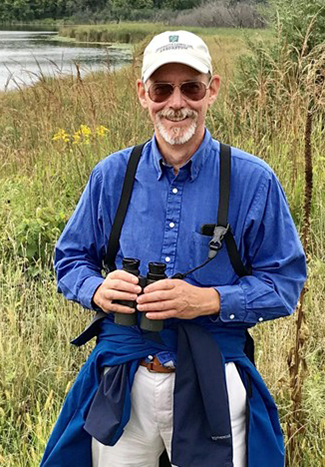
Having nature close by enriches our lives. This program provides ideas on how to bring more nature into our landscapes while capturing the spirit of your place. Insects run the world after plants: discover some keystone plants to nurture more insects and create a more sustainable landscape. Learn about maintenance that embraces nature to create a flourishing ecosystem: what does it take to have a diversity of bees, butterflies, and moths in your yard? Lastly, have faith in a seed, understand that plants migrate, and know if you plant it, they will spread. About the speaker: Alan Branhagen is the new (since July 15, 2023) Executive Director of the Natural Land Institute in Rockford, Illinois, one of the nation’s first land trusts and whose founder, George Fell, started the concept of legally protected nature preserves 60 years ago. NLI has been responsible for protecting more than 18,000 acres of natural land, mainly in Northern Illinois. Alan was Director of Operations at the University of Minnesota Landscape Arboretum in suburban Minneapolis-St. Paul (America’s 15th largest public botanical garden) from 2017-2023 where he managed Horticulture, Plant Curation, and Natural Resource Management of the 1,200-acre site. From 1996-2017 Alan was Director of Horticulture at Powell Gardens, Kansas City’s botanical garden where he was in charge of all horticulture and site planning as well as resource management of the 915-acre site. Alan’s career began at the Forest Preserves of Winnebago County in Rockford, Illinois, where for almost a decade he was in charge of all forest preserve planning, development, and management. He was part of the beginning of the Klehm Arboretum which launched his public horticulture career. Alan’s career has come full circle back to Rockford. Alan has a Bachelor of Landscape Architecture from Iowa State University and a Master of Landscape Architecture from Louisiana State University. He is the author of 3 books: The Gardeners Butterfly Book, Native Plants of the Midwest, and The Midwest Native Plant Primer. Alan will be available to sign copies of his books before the program. The program is free and open to the public. For more information contact Jerry Paulson, at 815-222-4414. To view the program via Zoom, please register at http://wildonesrrvc.org/
|
